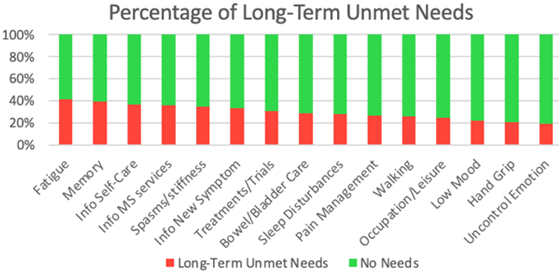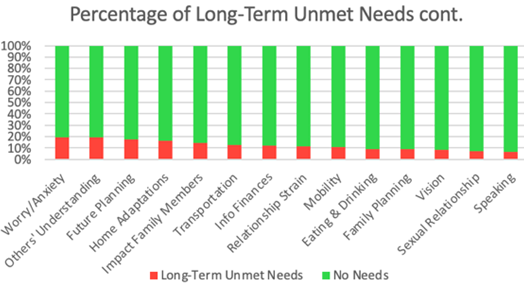MS researcher Harriet Moore shares study findings
Thanks to the kind support of MSRTE, I was able to attend and present my research at the European Congress of Treatment and Rehabilitation in Multiple Sclerosis (ECTRIMS) Annual Congress in Amsterdam, this October. ECTRIMS serves as the world’s largest professional organisation dedicated to the understanding & treatment of multiple sclerosis (MS). It organises educational activities dedicated to MS, to stimulate knowledge sharing and foster scientific advancements in the field, which influence clinical trials and MS guidelines.
The research I disseminated investigated the long-term unmet needs associated with MS. Participants were recruited through the Neurology Department of Royal Hallamshire Hospital, Sheffield. 123 patients agreed to participate and filled out the LUN-MS and MSIS (MS Impact Scale). The LUN-MS is a 28-item questionnaire exploring the prevalence and severity of long-term unmet needs in MS, split into four categories: informational, physical, psychological and social needs. Examples of these needs include knowing about available treatments/ what to do with a new symptom (informational needs), pain/ fatigue (physical needs), anxiety (psychological needs) and fulfilling social desires/ friends/ family understanding MS (social needs). It has been developed by MS specialists at Royal Hallamshire. Descriptive statistics were used to explore the prevalence of long-term unmet needs. Spearman’s Rho was used to assess the correlation between unmet needs, EDSS (Expanded Disability Severity Score) and MSIS scores.
Findings:
- 87% reported at least one long-term unmet need.
- Fatigue was the most frequent long-term unmet need with 41.5% reporting it, followed by memory (39%) and information on self-care (36.6%).
- 5% had at least one informational, 71% had at least one physical, 47.6% had at least one psychological and 39.5% had at least one social long-term unmet need.
 |
 |
- The number of long-term unmet needs did not correlate with EDSS (Spearman’s Rho (Rs(115)=-0.049, p=0.604). Thus, long-term unmet needs are not related to degree of physical ability or severity of the disease.
- LUN-MS scores showed significant correlation with MSIS physical (Rs(109)=0.607, P<0.001) and MSIS psychological (Rs(115)=0.773, P<0.001) domains.
Based on these findings, it was concluded that a significant proportion of long-term needs experienced by pwMS are not met by . Also, that MS had a greater physical and psychological impact on people a with higher number of unmet needs. These findings can be used to inform future service provisions to optimise the quality of life for pwMS.
This was an eye-opening and gratifying opportunity. Being able to disseminate my work at an international level enabled a greater understanding of the power to support people with MS within the European and global MS network. Attending ECTRIMS also led to conversations with multiple MS specialists, who could pass on their valuable knowledge, opinions and insight.
I am so grateful to MSRTE for supporting me with this opportunity and hope to give back in the future. Thank you.

